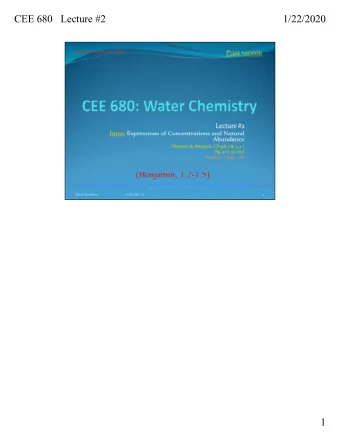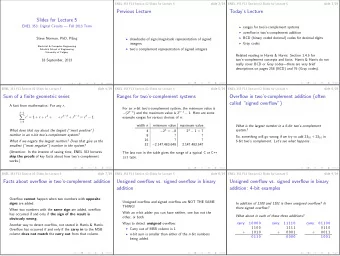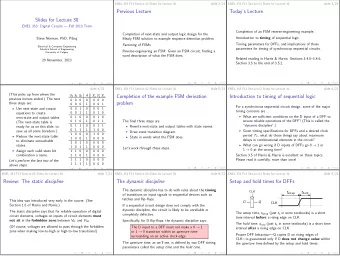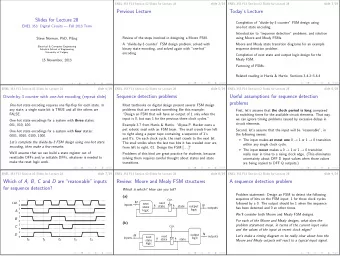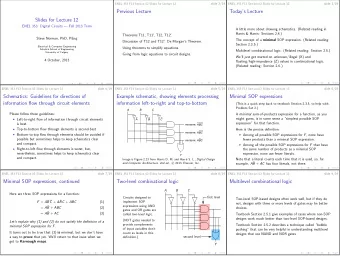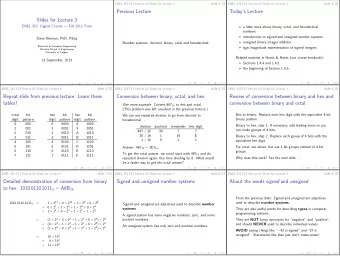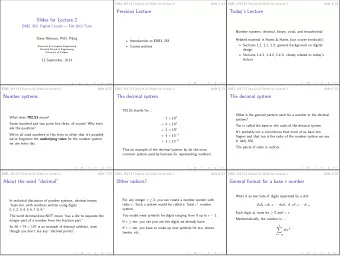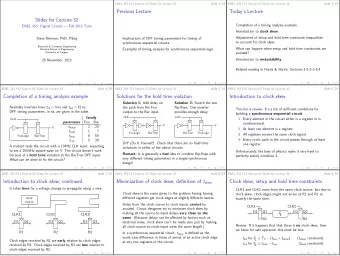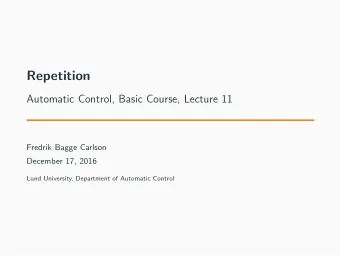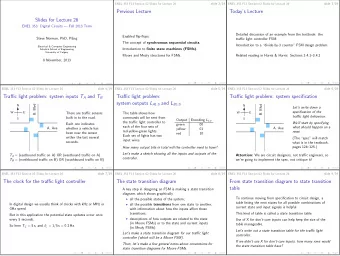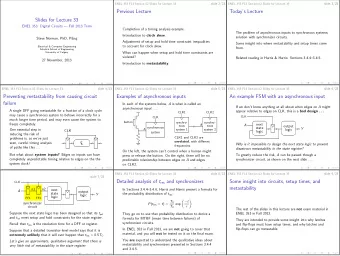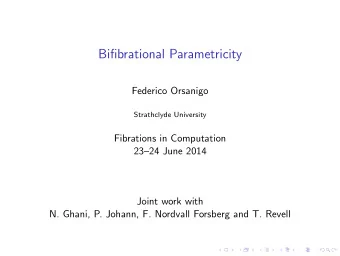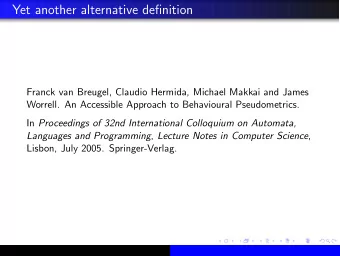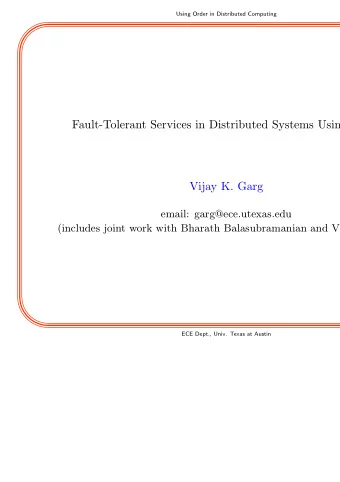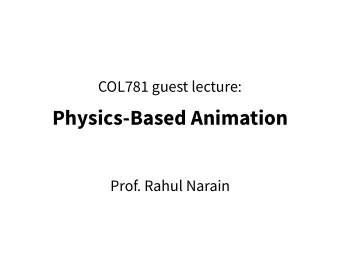
Lecture 6 Boost Library 9 Kenny Erleben Department of Computer - PowerPoint PPT Presentation
Lecture 6 Boost Library 9 Kenny Erleben Department of Computer Science University of Copenhagen K. Erleben, May 29, 2006 p. 1/28 c What is it about? Adds functionality and normalizes syntax for creating function objects on the
Lecture 6 Boost Library 9 Kenny Erleben Department of Computer Science University of Copenhagen � K. Erleben, May 29, 2006 – p. 1/28 c
What is it about? Adds functionality and normalizes syntax for creating function objects on the fly � K. Erleben, May 29, 2006 – p. 2/28 c
Function Object A function object looks like template<typename T> class MyFancyFunctor { public: void operator()( T const & value) const { ... } }; We use it like typedef MyFancyFunctor<Dodah> functor_type; std::vector<Dodah> data; ... for_each(data.begin(),data.end(),functor_type() ); � K. Erleben, May 29, 2006 – p. 3/28 c
The First Problem Say we have a function void my_fancy_function(Dodah const & value) { ... } So how do we use something like std::for_each with our function? for_each(data.begin(),data.end(), ? my_fancy_function(?)); � K. Erleben, May 29, 2006 – p. 4/28 c
The First Problem Or maybe we have a method class Hodah { public: void my_fancy_method(Dodah const & value) { ... } }; So how do we for_each(data.begin(),data.end(), ? Hodah::my_fancy_method(?)); � K. Erleben, May 29, 2006 – p. 5/28 c
The First Problem We might not have a functor object � K. Erleben, May 29, 2006 – p. 6/28 c
The Naïve Solution So we would write class A { }; void plain(A const & a){....} and std::list<A> lots; for(std::list<A>::iterator it = lots.begin();it != lots.end();it++) plain(*it); Why is this “ugly”? � K. Erleben, May 29, 2006 – p. 7/28 c
The Naïve Solution Well we could optimize it std::list<A> lots; std::list<A>::iterator it = lots.begin(); std::list<A>::iterator end = lots.end(); for(;it != end;++it) plain( *it ); Yeah, we got the performance But std::for_each already do all of these optimizations for us Oh there is a bunch of text ⇒ increase chance of a typo What if I wanted to use a vector container instead? Besides the above leads to repetitive code, is this clever? Conclusion it makes sense to use std::for_each , so let us write our functor. � K. Erleben, May 29, 2006 – p. 8/28 c
Getting Smart For this case the functor looks like struct DoTheDamnThing { void operator()(A const & a){ plain(a); } }; and now we can write std::for_each(lots.begin(),lots.end(),DoTheDamnThing()); Nice, we got a one-liner instead of four lines std::list<A>::iterator it = lots.begin(); std::list<A>::iterator end = lots.end(); for(;it != end;++it) plain( *it ); � K. Erleben, May 29, 2006 – p. 9/28 c Are we happy?
Staying on top of things In a typical simulator one often find class Tetrahedron { public: void compute_elastic_forces(){....} }; class Node { public: void compute_external_forces(){ ... } void position_update(){...} void velocity_update(){...} }; � K. Erleben, May 29, 2006 – p. 10/28 c
Staying on top of things In the simulation loop one would write std::for_each(nodes.begin(),nodes.end(), ?velocity_update? ); std::for_each(nodes.begin(),nodes.end(), ?compute_external_forces? ); std::for_each(tetrahedra.begin(),tetrahedra.end(), ?compute_elastical_force std::for_each(nodes.begin(),nodes.end(), ?position_update? ); Imagine having to write “wrapper” functor classes for all this Yikes we would just scatter the “logic” of our implementation See real-life example: “ OpenTissue/t4mesh/util/t4mesh_persson_strang_generator.h ” � K. Erleben, May 29, 2006 – p. 11/28 c
Functions and function pointers Given int f(int a, int b){ return a + b; } Then bind(f, 1, 2) Corresponds to a “nullary” function object class NullaryBindWrapper { public: int operator() { return f(1,2); } }; � K. Erleben, May 29, 2006 – p. 12/28 c
Functions and function pointers Given int g(int a, int b, int c) { return a + b + c; } Then bind(g, 1, 2, 3)() is equivalent to class Wrapper { public: int operator() { return g(1,2,3); } }; Wrapper w; w(); That is g(1, 2, 3) . � K. Erleben, May 29, 2006 – p. 13/28 c
Functions and function pointers It is possible to selectively bind only some of the arguments. bind(f, _1, 5)(x) is equivalent to f(x, 5); here _1 is a place-holder argument that means “substitute with the first input argument” For comparison, with STL std::bind2nd(std::ptr_fun(f), 5)(x); Yrgh!!! Boost bind is just so pretty... � K. Erleben, May 29, 2006 – p. 14/28 c
Functions and function pointers bind covers std::bind1st as well: std::bind1st(std::ptr_fun(f), 5)(x); // f(5, x) bind(f, 5, _1)(x); // f(5, x) Besides bind can handle functions with more than two arguments its argument substitution mechanism is more general bind(f, _2, _1)(x, y); // f(y, x) bind(g, _1, 9, _1)(x); // g(x, 9, x) bind(g, _3, _3, _3)(x, y, z); // g(z, z, z) bind(g, _1, _1, _1)(x, y, z); // g(x, x, x) � K. Erleben, May 29, 2006 – p. 15/28 c
Functions and function pointers Arguments are copied and held internally int i = 5; bind(f, i, _1); // copy of i stored in function object This might not be a good idea, say class Huge { ... char m_big_chunk[1024*1024*100]; } f(Huge & h,int i){...} Huge first; bind(f, first, 2); � K. Erleben, May 29, 2006 – p. 16/28 c
Functions and function pointers Solution, use boost::ref boost::cref to make the function object store a reference to an object int i = 5; bind(f, ref(i), _1); bind(f, cref(42), _1); No copying! � K. Erleben, May 29, 2006 – p. 17/28 c
Function objects Also bind is not limited to functions it accepts arbitrary function objects For instance struct F { int operator()(int a, int b) { return a - b; } bool operator()(long a, long b) { return a == b; } }; F f; int x = 104; bind<int>(f, _1, _1)(x); // f(x, x), i.e. zero � K. Erleben, May 29, 2006 – p. 18/28 c
Function objects When the function object exposes a nested type named result_type the explicit return type can be omitted: int x = 8; bind(std::less<int>(), _1, 9)(x); // x < 9 Note: the ability to omit the return type is not available on all compilers. � K. Erleben, May 29, 2006 – p. 19/28 c
Pointers to members Pointers to member functions data members are not function objects (do not support operator() ). For convenience, bind accepts member pointers as its first argument behavior is as if boost::mem_fn has been used to convert the member pointer into a function object The expression bind(&X::f, args) is equivalent to bind<R>(mem_fn(&X::f), args) where R is the return type of X::f (for member functions) or the type of the member (for data members.) � K. Erleben, May 29, 2006 – p. 20/28 c
Pointers to members Example: struct X { bool f(int a); }; X x; shared_ptr<X> p(new X); int i = 5; bind(&X::f, ref(x), _1)(i); // x.f(i) bind(&X::f, &x, _1)(i); //(&x)->f(i) bind(&X::f, x, _1)(i); // (internal copy of x).f(i) bind(&X::f, p, _1)(i); // (internal copy of p)->f(i) � K. Erleben, May 29, 2006 – p. 21/28 c
Function composition Arguments may be nested bind expressions So bind(f, bind(g, _1))(x); // f(g(x)) Note The inner bind expressions are evaluated, in unspecified order, before the outer bind when the function object is called the results of the evaluation are then substituted in their place when the outer bind is evaluated In the example above, when the function object is called with the argument list (x) , bind(g,_1)(x) is evaluated first, yielding g(x) and then bind(f, g(x))(x) is evaluated, yielding the final result f(g(x)) � K. Erleben, May 29, 2006 – p. 22/28 c
What about templates? On my M$ compiler template<typename T> void plain(T t){}; ... std::list<A> lots; ... std::for_each( lots.begin(), lots.end(), boost::bind( plain, _1) ); results in d:\work\...\src\bind_fun.h(64) : error C2896: ’boost::_bi::bind_t<R,boost:: d:\work\...\src\bind_fun.h(51) : see declaration of ’plain’ d:\work\...\src\bind_fun.h(64) : error C2784: ’boost::_bi::bind_t<R,boost:: D:\work\third.party\boost_1_33_1\boost\bind.hpp(1616) : see declara d:\work\...\src\bind_fun.h(64) : error C2780: ’boost::_bi::bind_t<R,boost:: D:\work\third.party\boost_1_33_1\boost\bind\bind_mf_cc.hpp(222) : s d:\work\...\src\bind_fun.h(64) : error C2780: ’boost::_bi::bind_t<R,boost:: � K. Erleben, May 29, 2006 – p. 23/28 c
What about templates? Yikes, template functions can not be bound? std::for_each( lots.begin() , lots.end() , boost::bind( plain<A>, _1) ); Unless we help the compiler. � K. Erleben, May 29, 2006 – p. 24/28 c
What about templates? Now consider class A { public: template<typename T> void doit(T t){....} }; and std::for_each( lots.begin() , lots.end() , boost::bind( &A::doit<A>, _1) ); Guess what happens? � K. Erleben, May 29, 2006 – p. 25/28 c
More Cool Stuff Now what if we wrote class A { public: void doit(){...} }; And say we have std::list<A *> B; Now how would we go about invoking doit on all elements in B ? std::list<A*>::iterator it = B.begin(); std::list<A*>::iterator end = B.end(); for(;it != end;++it) (*it)->doit(); Oh no even more ugly (* )-> -syntax, but with bind � K. Erleben, May 29, 2006 – p. 26/28 c for_each(B.begin(),B.end(), bind( &A::doint, _1) );
More Cool Stuff And it can even figure out std::list<boost::shared_ptr<A> > B; � K. Erleben, May 29, 2006 – p. 27/28 c
Recommend
More recommend
Explore More Topics
Stay informed with curated content and fresh updates.

